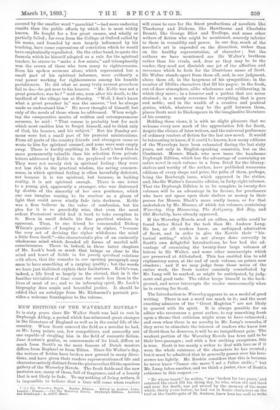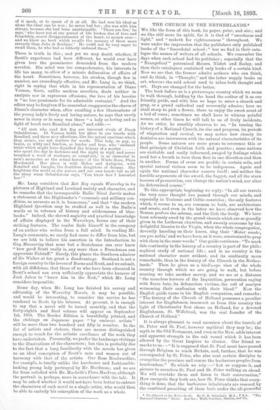NEW EDITIONS OF THE WAVERLEY NOVELS* IT is sixty years
since Sir Walter Scott was laid to rest in Dryburgh Abbey, a period which has witnessed great changes in the literature of England as well as in the social life of the country. When Scott entered the field as a novelist he had, as Mr. Lang points out, few competitors, and assuredly not one capable of rivalling him in the field of romantic fiction. Jane Austen's genius, so consummate of its kind, differs as much from Scott's as the most famous of Dutch masters differs from Raphael or from Titian. Since Sir Walter's day, the writers of fiction have broken new ground in many direc- tions, and have given their readers representations of life and character entirely distinct from the pictures that fill the spacious gallery of the Waverley Novels. The fresh fields and the new pastures are, many of them, full of fragrance, and of a beauty that is not likely to fade. To say nothing of living writers, it is impossible to believe that a time will come when readers • •ta The Wtouertov Nerds. Border Edition, Edited by Andrew Lang. London Nitntno.—(2.) The Waverlev Novels. Dryburgh Edition. London and Edinburgh A. and C. Black.
will cease to care for the finest productions of novelists like Thackeray and Dickens, like Hawthorne and Charlotte BronW, like George Eliot and Trollope, and some other writers of fiction who might be mentioned, scarcely inferior to these in versatility and power. In our day, much of the novelist's art is expended on the dissection, rather than on the healthy representation, of character ; but the authors we have mentioned are Sir Walter's brethren rather than his rivals, and, dear as they may be to the
reader, they need not diminish one jot of the affection and reverence which he feels for the illustrious name of Scott.
Sir Walter stands apart from them all, and, in our judgment, above them all, in the largeness of his sympathies ; in the number of lifelike characters that till his pages ; in the fresh, out-of-door atmosphere, alike wlaolesome and exhilarating, in which they move ; in a humour and a pathos that are never strained ; in a manly reverence for everything that is pure and noble; and in. the wealth of a creative and poetical genius, which, whatever may be the gulf between them, places Scott next to Shakespeare in the imaginative literature of his country.
Holding these views, it is with no slight pleasure that we welcome every new mark of the appreciation felt for Scott, despite the claims of later writers, and the universal preference of ordinary readers of fiction for the last new novel. It would be interesting to know, if it could be known, how many editions
of the Waverleys have been exhausted during the last sixty years, not only in English-speaking countries, but on the Continent. Messrs. Black, who now issue the handsome Dryburgh Edition, which has the advantage of containing an
entire novel in each volume in a form fitted for the library shelves and worthy of the author, have published numerous editions of every shape and price, the palm of them, perhaps, being the Roxburgh issue, which appeared in the sixties, and, like Sir Walter's favourite edition, in forty-eight volumes. That the Dryburgh Edition is to be complete in twenty-five volumes will be an advantage in its favour, for purchasers who have not space upon their shelves or money in their purses for Messrs. Black's more costly issues, or for that undertaken by Mr. Nimmo, of which ten volumes, containing Waverley, Guy Mannering, The Antiquary, Rob Roy, and Old Mortality, have already appeared.
If the Waverley Novels need an editor, no critic could be found better fitted for the task than Mr. Andrew Lang.
He has, as all readers know, an unfeigned admiration of Scott, and in order to give the Novels their "his- torical setting," which is not always done correctly in Scott's own delightful Introductions, he has had the ad- vantage of examining the twenty-four large volumes of letters to Sir Walter, and some other manuscripts which are preserved at Abbotsford. This has enabled him to add explanatory notes, at the end of each volume, on points now obsolete ; and if we may judge from these notes of the entire work, the fresh matter concisely contributed by Mr. Lang will be marked, as might be anticipated, by judg- ment and good taste. The editor keeps himself in the back- ground, and never interrupts the reader unnecessarily when he is craving for Scott.
The Introduction to Waverley appears to us a model of good writing. There is not a word too much in it; and the most exacting admirers of the "Great Magician" are not likely to quarrel with its spirit. It is always possible for an editor who reverences a great author, to say something fresh upon a theme that criticism might seem to have exhausted ; and oven when there is no novelty in Mr. Lang's remarks, if they serve to stimulate the interest of readers who know less of Scott than he deserves, it will be no insignificant gain. The weakest portion of the Waverley Novels has been said to be their love-passages ; and with a few striking exceptions, this is true. Scott is too manly a writer to deal with love as if it were the whole existence of the characters he has created ; but it must be admitted that he generally passes over his love. scenes too lightly. Mr. Ruskin considers that this is because he never knew "Paanor che move '1 sol e l'altre stelle ; " but Mr. Lang takes another, and we think a pater, view of Scott's reticence in this respect :—
"He whose heart," he writes, "was 'broken for two years,' and retained the emelt till his dying day, he who, when old and tired and near his death, was yet moved by the memory of the name which, thirty years before, he had cut in Runic characters on the turf at the Castle-gate of St. Andrew, knew love too well to write
of it much, or to speak of it at all. He had won his ideal as alone the ideal can be won ; he never lost her ; she was with him always, because she had been unattainable. • There are few,' he says, who have not at one period of life broken ties of love and friendship, secret disappointments of the heart, to mourn over— and we know no book which recalls the memory of them more severely than Julia de Roubigne: He could not be very eager to recall them, he who had so bitterly endured them."
There is truth in this ; and yet we may doubt whether, if Scott's experience had been different, he would ever have given love the prominence demanded from the modern
novelist. His mind was too comprehensive, his interests in life too many, to allow of a minute delineation of affairs of the heart. Sometimes, however, his strokes, though few in
number, are exceedingly effective, and Mr. Lang is, we think, right in saying that while in his representation of Diana Vernon, Scott, unlike modern novelists, deals neither in analysis nor in rapturous effasions, the love of his heroine is "no less passionate for its admirable restraint." And the editor may be forgiven if he somewhat exaggerates the charm of Diana's character when, after recalling a few illustrations of the young lady's lively and loving nature, he says that surely never in story or in song was there "a lady so loving and so light of heart save Rosalind alone," and adds :— "All men who read Rob Roy are innocent rivals of Frank Osbaldistone. Di Vernon holds her place in our hearts with Rosalind, and these airy affections, like the actual emotions which they mimic, are not matters for words. This lady, so gay, so brave, so witty and fearless, so tender and true, who endured
trials which might have dignified the history of a martyr who spent the day in darkness and the night in vigil, and never breathed a word of weakness or complaint,' is as immortal in men's memories as the actual heroins of the White Rose, Flora Macdonald. Her place is with Helen and Antigone, with Rosalind and Imolgen, the deathless daughters of dreams. She brightens the world as she passes, and our own hearts tell us all the story when Osbaldistone says, You know how I lamented her.'"
Mr. Lang considers that Rob Roy equals Waverley in its pictures of Highland and Lowland society and character, and he remarks that the incomparable Bailie Nicol Jarvie makes a statement of the Highlander's "economic and military con- dition, as accurate as it is humorous," and that "the modern Highland Question may be studied as well in the Bailie's words as in volumes of history and wildernesses of blue- books." indeed, the shrewd sagacity and practical knowledge of affairs displayed in the Waverleys, forms one of their etriking features. The reader finds himself in the company of an author who writes from a full mind. In reading Mr. Lang's comments, we rarely find cause to differ from him, but we are loth to believe his assertion in the Introduction to Guy Mannering that none but a Scotchman can ever know " how good Scott really is, any more than a Frenchman can appreciate Falstaff." Surely, this places the Southern admirer of Sir Walter at too great a disadvantage. Scotland is not a foreign country to the lovers of Burns and Scott, and we submit,
with all diffidence, that those of us who have been educated in Scott's school can even sufficiently appreciate the humour of Jock Jabos to "know him in the flesh," which Mr. Lang considers impossible.
Some day, when Mr. Lang has finished his survey and editorship of the Waverley Novels, it may be possible, and would be interesting, to consider the service he has rendered to Scott by his labours. At present, it is enough to say that a novel will be issued monthly, and that the forty-eighth and final volume will appear on September 1st, 1894. The Border Edition is beautifully printed, and the etchings on Japanese paper "by eminent artists" will be more than two hundred and fifty in number. In the
list of artiste and etchers, there are names distinguished enough to vouch for the artistic excellence of the work they have undertaken. Personally, we prefer the landscape etchings to the illustrations of the characters ; but this is probably due to the fact that a long familiarity with the novels has given us an ideal conception of Scott's men and women out of harmony with that of the artists. Our Rose Bradwardine, for example, is totally unlike the handsome and fashionable- looking young lady portrayed by Mr. Hardman; and we are far from satisfied with Mr. Macbeth's Flora Madvor, although the portrait is, perhaps, more in accordance with the tale. It may be asked whether it would not have been better to entrust the characters of each novel to a single artist, who would then be able to embody his conception of the work as a whole.



































 Previous page
Previous page